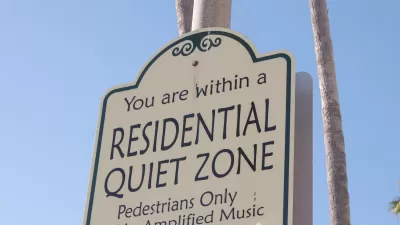New research shows that excessive noise levels have significant negative impacts on heart health.

Many urban dwellers know the familiar fatigue caused by persistent traffic and aircraft noise, but it's not just hearing and mental health that suffer. New research shows that sound can have deleterious effects on heart health, report Cypress Hansen and Knowable Magazine in The Atlantic.
A German cardiologist living near the Frankfurt Airport started studying the issue after the airport installed a new runway, adding to the daily air traffic and noise experienced by its neighbors. "In the last decade, a growing body of research more directly links air and road-traffic noise to heightened risks for a number of cardiovascular ailments—and scientists are starting to pinpoint the mechanisms at play." In the case of the Frankfurt airport, people living nearby have a 7% higher risk of stroke.
Research like this has spurred city leaders around the world to more closely analyze the effects of urban noise on health and take measures to mitigate the impact of noise pollution on public health. "Despite the remaining questions, there’s a growing recognition of connections between noise pollution and reduced physical health. A 2018 report by the World Health Organization noted that each year, Western Europeans are collectively losing more than 1.6 million years of healthy life because of traffic noise." As the data become clearer, cities can develop more comprehensive strategies to minimize noise pollution and protect public health.
FULL STORY: Traffic Noise Is a Silent Killer

Trump Administration Could Effectively End Housing Voucher Program
Federal officials are eyeing major cuts to the Section 8 program that helps millions of low-income households pay rent.

Planetizen Federal Action Tracker
A weekly monitor of how Trump’s orders and actions are impacting planners and planning in America.

Ken Jennings Launches Transit Web Series
The Jeopardy champ wants you to ride public transit.

Opinion: Transit Agencies Must View Service Cuts as Last Resort
Reducing service could cripple transit systems by pushing more riders to consider car ownership, making future recovery even less certain.

‘Smart Surfaces’ Policy Guide Offers Advice for Building and Maintaining Urban Tree Canopies
Healthy, robust tree canopies can reduce the impacts of extreme heat and improve air quality.

New Jersey Lawsuit Targets Rent-Setting Algorithms
The state of New Jersey is taking legal action against landlords and companies that engage in what the state’s Attorney General alleges is illegal rent fixing.
Urban Design for Planners 1: Software Tools
This six-course series explores essential urban design concepts using open source software and equips planners with the tools they need to participate fully in the urban design process.
Planning for Universal Design
Learn the tools for implementing Universal Design in planning regulations.
Heyer Gruel & Associates PA
Ada County Highway District
Institute for Housing and Urban Development Studies (IHS)
City of Grandview
Harvard GSD Executive Education
Toledo-Lucas County Plan Commissions
Salt Lake City
NYU Wagner Graduate School of Public Service





























